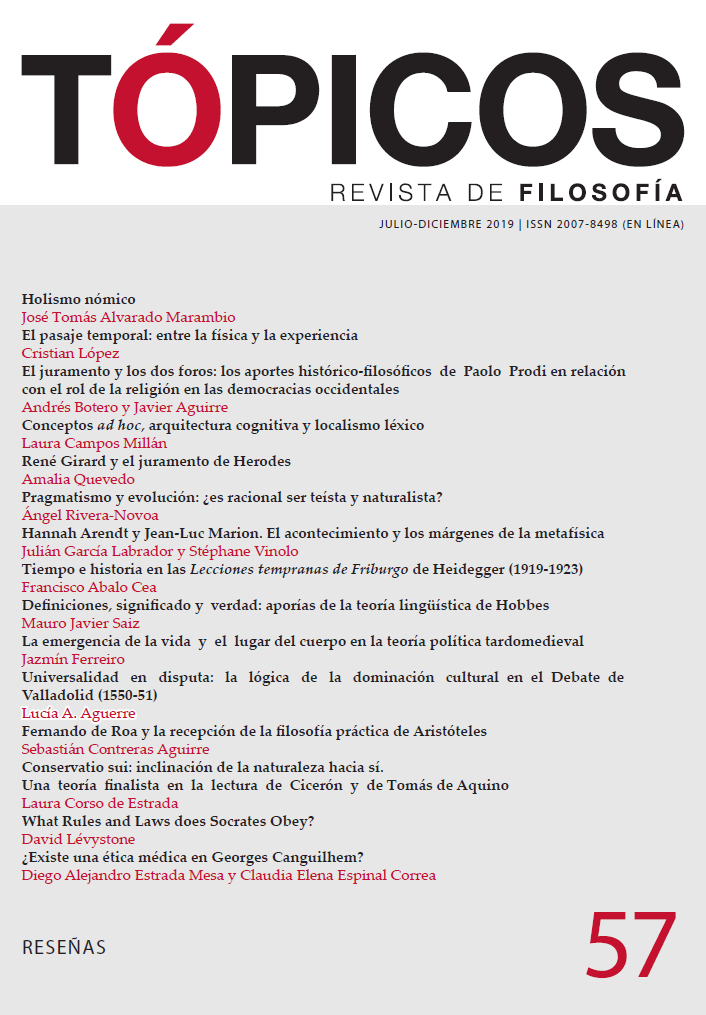Conservatio sui: Inclination of Nature to Itself. A Finalistic Theory in the Reading of Cicero and Thomas Aquinas
Published 2019-06-29
Keywords
How to Cite
Downloads
Altmetrics
Citas
Abstract
The aim of this article is to consider, in the first place, the characteristic traits of ciceronian conception about “conservatio sui” in the context of ciceronian practical philosophy, differentiating between the components of stoic tradition and the position that Cicero proposes as its own. The article makes its center in the ciceronian exposition of De finibus III and IV and passages of other works that allow us to elaborate the links between natura, ratio and lex established by Cicero. In second place, the article proposes a comparison of the ciceronian elaboration of “conservatio sui” with passages of the corpus of Thomas Aquinas, specially with Tractatus de legibus of Summa Theologiae.
References
- Fuentes
- Cicerón, M. T. (1961). Academicorum reliquiae cum Lucullo. O. Plasberg (ed.), Stuttgart: Teubner.
- ---- (1991). De fato. A. Yong (ed. y trad.), París: Les Belles Lettres.
- ---- (1961). De finibus bonorum et malorum. T. Schiche (ed.), Stuttgart: Teubner.
- ---- (1967). De finibus bonorum et malorum. J. Martha (ed. y trad.), París: Les Belles Lettres. (ed. revisada por C. Lévy, Paris: 1999).
- ---- (1998). Sobre los fines y males extremos, L III. En V. Juliá, M. Boeri, y L. Corso de Estrada (eds.), Las exposiciones antiguas de ética estoica. L. Corso de Estrada (trad. anot. y est. prel.), Buenos Aires: EUDEBA.
- ---- (1965). De inventione Rhetorica. E. Stroebel (ed.), Stuttgart: Teubner.
- ---- (1968). De legibus. G. De Plinval (ed. y trad.), París: Les Belles Lettres.
- ---- (2019). Sobre las Leyes. L. Corso de Estrada (trad., est. prel., notas y apéndices), Buenos Aires: COLIHUE-CLÁSICA.
- ---- (1961). De natura deorum. W. Ax (ed.), Stuttgart: Teubner.
- ---- (1965). De officiis. M. Testard (ed. y trad.), París: Les Belles Lettres.
- ---- (1992). De republica. K. Ziegler (ed.), Stuttgart: Teubner.
- Diógenes Laercio. (1962). Vite Dei Filosofi. Marcelo Gigante (ed.), Bari: Laterza.
- Felipe el Canciller. (1985). Philippi Cancellarii Parisiensis Summa de Bono. N. Wicki (ed. y est. prel.), Berna: ed. A. Francke.
- Guillermo de Auxerre. (1985). Summa aurea Magistri Guillelmi Altissiodorensis. J. Ribaillier (ed.), París-Roma: Centre National de Recherches Scientifique-Collegi S. Bonaventurae ad Claras Aguas.
- Séneca, L. A. (1999). De Beneficiis, Epistulae. M. Rosenbach (ed., trad. y notas), Darmstadt: Wissenschaftliche Buchgesellschaft.
- Tomás de Aquino. (1980). Opera omnia. R. Busa (ed.), Stuttgart-Bad Cannstatt: Frommann-Holzboog.
- Bibliografía
- Barnes, J. (1997). Antiochus of Ascalon. En M. Griffin y J. Barnes (eds.), Philosophia Togata I. Essays on Philosophy and Roman Society. (pp. 78-80). Oxford: Clarendon Press.
- Colish, M. (1985). The Stoic Tradition from Antiquity to the Early Middle Ages. Leiden: Brill.
- Corso de Estrada, L. (2008). Naturaleza y vida moral. Marco Tulio Cicerón y Tomás de Aquino. Pamplona: EUNSA.
- ---- (2012). Oikeíosis. Ciceronian Reading and XIII Century Receptions. En A. Vigo (ed.), Oikeíosis and the Natural Basis of Morality. From Classical Stoicism to Modern Philosophy. (pp. 67-94). Hildesheim: G. Olms.
- ---- (2014). Finalismo y racionalidad de la naturaleza en las primeras Summae del siglo XIII. La tradición del ´ius naturale´ en Guillermo de Auxerre y en Felipe Canciller. Patristica et Mediaevalia, 35, 43-60.
- ---- (2015). Natura ut ratio. Componentes del finalismo de tradición estoica en Rabano Mauro, Felipe Canciller y Tomás de Aquino. En Fuertes Herreros- A. Poncela González (eds.), De natura, La naturaleza en la Edad Media. Vol. I. J. (pp. 63-79). Ediciones Húmus, Gabinete de Filosofía Medieval-Publicaciones Salamanca.
- ---- (2016). El binomio naturaleza-racionalidad. La concepción ciceroniana sobre las inclinaciones naturales en la Summa de bono de Felipe Canciller. En A. Setaioli (ed.), Apis Matina. (pp. 158-166). Trieste.
- Doyle Sánchez, D. (2014). La doctrina estoica de la oikeíosis. Reconstrucción sistemática de la fundamentación de la moral en el estoicismo. Hildesheim: G. Olms.
- Dörrie, H. (1987). Die geschichtlichen Wurzel des Platonismus. Text, Ubersetzung, Kommentar. Stuttgart: Fromman Holzbog.
- Engberg-Pedersen, T. (1990). The Stoic Theory of Oikeíosis. Moral Development and Social Interaction in Early Stoic Philosophy. Aarhus: University Press.
- Ernout, A. y Meillet, A. (1959). Dictionnaire étymologique de la langue latine. Histoire des mots. París: Librairie C. Klincksieck.
- Glucker, J. (1978). Antiochus and the Late Academy. Gottingen: Vandenhoeck-Ruprecht.
- Lévy, C. (1993). La Nouvelle Académie a t-elle été antiplatonicienne? En M. Dixsaut (ed.), Contre Platon 1. (pp. 139-156). París.
- Lories, L. (1998). Le sens común et le jugement du phronimos. Aristote et les stoïciens. Louvain: J. Vrin.
- Lottin, O. (1949). Psichologie et morale aux XII et XIII siécles. Problémes de morale II. Vol. III. C. J. Duculot (ed.), Louvain-Gembloux: Abbaye du mont.
- Magnaldi, G. (1991). L`oikeíosis peripatetica in Ario Didimo en el `De finibus`di Cicerone. Firenze: Casa Editrice Le Lettere.
- Pembroke, S. (1971). Oikeíosis. En A. Long (ed.), Problems in Stoicism. Londres: The Athlone Press.
- Pesce, D. (1977). L´etica stoica nel terzo libro del de finibus. Brescia: Paideia.
- Radice, R. (2000). Oikeíosis, Ricerche sul fondamento del pensiero stoico e sulla sua genesi. Milano: Vita e Pensiero.
- Schofield, M. y Striker , G. (eds.) (2007). The Norms of Nature. Studies in Hellenistic Ethics. Cambridge: University of Cambridge Press.
- Spanneut, M. (1984). Influences stoïciennes sur la pensée morale de saint Thomas D´Aquin. Studi Tomistici. (pp. 59-79). Vaticano.
- Verbeke, G. (1983). The Presence of Stoicism in Medieval Thought. Washington D.C.: The Catholic University of America Press.






